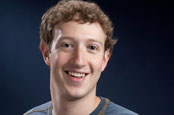
News that LinkedIn, the social network for business executives, is now valued by investors at $1bn, following a $53m funding round last week, has again raised the question of whether social networks can generate returns for their investors.
Brand consultant Andrew Marsden, a former Britvic marketing director, believes that risk of annoying users by infringing privacy has led many advertisers to treat social networks with caution.
He said: "There is an inherent conflict between the product and business model in all these social sites."
This was illustrated last November, when Facebook chief executive Mark Zuckerberg's first active attempt to exploit the commercial potential of Facebook backfired because its ad platform, Beacon, sparked privacy fears among users, and was subsequently relaunched.
Grant Allaway, joint managing director of digital ad agency Ad2One, said: "Facebook hasn't got it right yet - Beacon relied on users to recommend ads by word of mouth, but it's a bit naive to think friends and family want to talk to each other about brands on social networks."
However, he added that inform-ation for users of "premium" or "business" social sites, such as LinkedIn, is highly desirable to brands who, he estimates, will pay about £40 to £50 per thousand page impressions to advertise on LinkedIn, compared to about 50p per thousand on MySpace.
Bebo, for example, has attracted an estimated 25 million views worldwide to its online drama, Kate Modern. Six advertising partners - including Procter & Gamble - are reportedly paying up to £250,000 to have their names integrated into the storyline, and observers believe such an approach could prove popular.
How to make money from social networks...
Khalil Ibrahami, managing director, Unanimis
The idea that social networks will make lots of money for their shareholders is a busted flush. These networks think that they are going to get money, but in the climate we operate in you need to provide brand security. Unless social networks can create a safe environment within which brands can advertise and comply with Iash, then soon there will be no money spent on them.
Alex Randall, head of digital trading, Isobar
Social networks can be a strong platform if you are a brand trying to engage with people - especially a younger demographic. The challenge is talking to users in the right way. Social networks are personal to people. You have to communicate in a way that rewards them for letting you in by offering exclusive content, prizes or discounts.
Dan Clays, managing director, BLM Quantum
Social media sites have caused considerable hype in terms of the potential long-term size of the market due to the speed in which it has developed. But we are now seeing more realistic trading forecasts for social networks - and a bit of realism in this market is no bad thing.
Andrew Cocker, co-founder, Infectious Media
The biggest challenge social networks have to overcome is that people use them to interact with friends and are in a mindset to reflect that. Overtly plastering ads over their social space, without an "invitation", is like gatecrashing a party. People become bored of you very quickly and you are not likely to be tolerated for any length of time.
MySpace leads the way with Google deal
Social networks have had differing degrees of success in tapping into ad revenues. MySpace arguably leads the way. Its three-year deal with Google, struck by News Corp chief operating officer Peter Chernin, under which Google powers MySpace's web search and advertising listings, guarantees MySpace a minimum of $900m. The Google deal is expected to pay for News Corp's $580m acquisition of MySpace in 2005.
In March, Time Warner-owned AOL acquired Bebo for $850m in cash. As a privately owned company, financial data is hard to come by, although analysts claim Bebo's revenues for 2007 were $20m. Last September, the network awarded Yahoo its UK and Ireland advertising account, although the terms of the deal remain undisclosed.
Given its huge user base and older user profile than Bebo and MySpace, the consensus is that Facebook has the greatest commercial potential.
Founder Mark Zuckerberg revealed that Facebook generated $150m in revenue in 2007 and this year expects to earn $350m - potential that prompted Microsoft to buy a 1.6 % stake for $240m.
According to Nielsen Online, Facebook attracted 258 advertisers between January and May and generated two billion page impressions (compared to Bebo's 715 million and MySpace's 846 million).



.jpg)
.jpeg)
